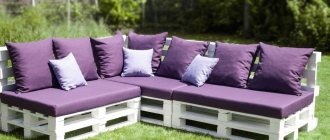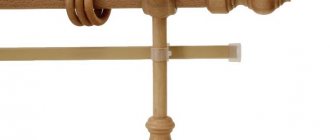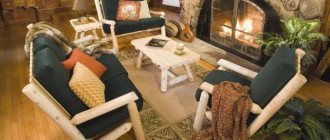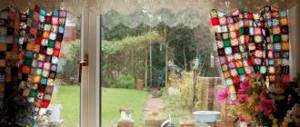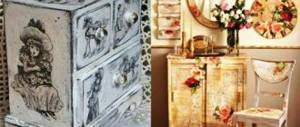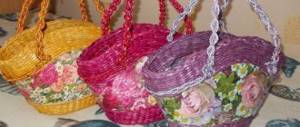How often have you caught yourself thinking that your interior is missing one, but very important detail? Did you want to change something in him, but didn’t know what? Covers for chairs with a backrest are exactly the element that is so lacking in a modern, cold and often devoid of warmth and personality interior. Today the editors of HouseChief.ru will tell you how to choose the right fabric elements for a certain style of room, what to look for when choosing fabric, how to draw up a pattern and make a unique set of covers yourself.
A game of contrast or an accessory to match? Chair covers can be different, but they will always emphasize the taste of the hostess and create a unique atmosphere of celebration.
Features of chair covers with backrest: not only beautiful, but also functional
A cover is not just clothing for your chair, but its second life. Sometimes sprucing up a worn-out piece of furniture is much cheaper than replacing or buying it, especially when the furniture is dear to your heart and brings back memories. Of course, an old chair can be painted, but won’t it lose its originality?
Perhaps the paint will hide the inscriptions dear to your heart or that very spot of paint that you accidentally planted when you painted your first birdhouse?
In this case, the case will hide all the imperfections without touching the most precious things - memories and original appearance. Modern furniture can also be updated using covers. For example, when a purchased pair of chairs does not at all match the new set in style or color scheme.
The chair seat cover can be used as a separate decorative element, decorating it with a spectacular bow or a useful and spacious pocket for small items
In addition, this is a great way to protect furniture from dirt or hide flaws in its assembly.
Classification of covers for chairs with backrest by type
If you think that there is nothing simpler than a chair with a backrest, you are very mistaken. Like any cover, furniture clothing comes in different types and styles. With a complex structure, for example, drapery, hand finishing, or a simple and strict, tight-fitting chair.
Features of manufacturing tight-fitting covers
Such capes tightly fit the seat and back of the chair. Compared to human clothing, it's practically a turtleneck. Only for the chair. They can be made of stretch fabric and secured with ties and Velcro. Typically, such covers are made specifically to fit the size of the chair. In rare cases, “liberty” in the form of fringe is allowed.
Difficulties in draping loose-fitting covers
Covers with complex drapery add festiveness and chic to any room. Typically, such capes can be found in banquet halls and celebration rooms. The main thing is that the bulky fabric does not interfere with the main functions of the piece of furniture.
Such covers are considered one of the most difficult to perform, since the drapery must be carefully laid and fixed. A spectacular bow is most often used as a “holding” part.
A loose cut opens up a lot of possibilities for choosing fabrics; they can be used in contrast, of different types. Cover the chair completely or partially
When to choose draped capes
Loose-cut draped capes are most often used not to protect seats, but to decorate the interior for the holiday. An ordinary piece of fabric decorated with a bow can be used - the effect will be amazing. The advantage of such covers is that they are suitable for use on almost any seat. Usually, flowing fabrics such as organza, silk, and voile are chosen for these purposes.
An interesting solution would be to use the fabric itself, without fastening seams or any decorations.
Combined fabrics decorated with flowers or a bow look great
Sometimes the decor of the chairs can in some way copy the outfits of the guests. You certainly can’t make a mistake about where someone’s place is.
What are universal chair covers?
These covers fit standard size chairs. They are most often made from dense, stretchable fabric that takes the shape of any chair. They are also called Euro covers. They perfectly hide all imperfections and are affordable. Typically, such covers are very easy to clean, keep their shape, and are highly wear-resistant.
Eurocover is a practical and inexpensive solution for those who want to quickly change their interior
These covers are perfect for both chairs and armchairs. They can be bought at a bargain price, and the covers themselves are suitable for chairs with different backs.
Eurofabric has an interesting structure that stretches well and takes any shape close to the standard one. Sometimes a similar fabric is used for finishing, but without the “memory” effect
DIY chair covers
There is nothing difficult about sewing chair covers yourself. This is a great way to use up your fabric stash and give your kitchen a new look.
Fabric pattern
The initial stage of sewing covers, after deciding on the model and fabric, is to make a pattern. Its configuration completely depends on the model of the selected case. To carry out the process, it is necessary to use a material that can take shape well, cover the chair and secure it all with tailor's pins in the right places. At this stage, the shape, length, and presence of a fastener on the future case are immediately highlighted.
Measurements are taken using tracing paper. For this:
This is a standard method for making a pattern that is suitable for making covers with a back and a skirt. It is worth remembering that the simpler the product, the fewer elements you will have to cut out for it.
How to sew a cover for a chair with a back
To give the dining area a luxurious appearance, it is decorated with chair covers with a back and a fold at the back. This option is popular among housewives, so let’s look at how to sew it step by step:
This is how you can easily sew original chair covers. At the same time, you can use various combinations of fabrics and designs, which will help the product become individual.
How to sew a universal chair cover
No less popular are chair covers that cover only the seat without affecting the back. They can be of any design that the craftswoman will like and will fit the overall concept of the kitchen. This cover model is suitable not only for a regular chair, but also for a stool and even a bar stool. Even someone who does not have sufficient experience and has never been involved in such a process can sew such a cover.
Here are several options for how to sew such products for chairs:
The easiest way is to make a pillow from two halves of fabric. To do this, according to the shape of the seat, a seat pattern is made on tracing paper in two copies as described in the previous case. Don't forget to add 1.5 cm for allowances. After this, parts are cut out from the fabric, and padding polyester is cut out using the same shape. The fabric components are sewn together, a thin layer of synthetic padding is placed inside and finally stitched or completed with a zipper. It is best to make a diamond-shaped stitch on the surface. The edges of the cover can be decorated with a skirt or trim. At the corners, ties made of the selected material are attached to it.
For those who knit, a yarn cover will be an easy option. It is best to choose bright and thick yarn to make the product voluminous.
The cover, sewn from many small pads of different colors and textures, looks interesting. Such a riot of colors will add originality, for example, to a kitchen in the shabby chic style.
Cover for high chair
Often young mothers are faced with a situation where the cover on the high chair is damaged and can no longer be used or is not there at all. In this case, you can make this product yourself. Sewing a cover for a high chair with your own hands also becomes important when you need a replacement option while the first one is being washed.
There is no universal pattern for sewing such a product, since high chairs vary in configuration and size, so you should always rely on the design of specific furniture.
For a children's high chair, it is necessary to sew a removable type model, since it will have to be removed quite often for cleaning. Such a product usually consists of several layers:
- the top one is fabric or oilcloth that will not allow water to pass through;
- intermediate - filling made of padding polyester, foam rubber or other material;
- bottom (lining) - hard fabric, for example, linen or cotton synthetics, the use of lining is allowed.
The easiest way is to sew a cover for a highchair similar to an existing standard one. To do this you need:
Thus, if you follow the technology, you can even sew a cover for a children's high chair, which will ideally complement the seat for the baby.
It also happens that there was no cover on the chair initially, for example, the chair was made independently or received from relatives or friends.
The difference in creating such a product is that the pattern will have to be made directly from the chair, and not from a finished likeness. To do this, a white cloth or tracing paper is placed on the chair, onto which the outlines of the back and seat are transferred. The pattern should also contain the desired places for stitching, but if they are not there, then you can leave it as is. Further actions are repeated in the same way as described earlier.
Sometimes a filler that holds its shape well can be used. This will avoid adding a pocket to the cover that fits over the back of the chair. This model will be the optimal complement for a wooden high chair.
Criteria for choosing fabric for chair covers: what is important to remember
The fabric determines the result of the work by almost 50%, the rest is the skill of the seamstress. When choosing a material, it is important to consider what room the cape is being sewn into, what functions it will perform (except for protection), perhaps the cape will serve as additional storage space.
Advice! When choosing fabrics to match, be sure to test them for soak staining. Cheap fabrics may lose their “marketable appearance” after the first wash.
Let's look at the main types of fabrics that are most often used when sewing chair covers. Among the most anticipated fabrics to list, we’ll probably name linen. Surprised? In our ranking of upholstery fabrics, this natural material takes honorable first place. The fact is that flax has a unique ability to self-clean
Interesting fact! In ancient times, people wore linen shirts for at least 10 years. In the absence of washing machines and modern cleaning products, this is a good reason to choose this fabric.
Among the disadvantages are traditional ones: the fabric wrinkles quickly and is difficult to smooth out. Such covers will fit perfectly into the interior of a cottage or kitchen in the Provence style.
Crepe satin is an ideal upholstery option. Easy to wash and clean, practically does not get wet. It is very convenient because it stretches well and, with some skill, can “fit” onto any chair with almost no loss.
Brocade is a spectacular but short-lived material. This is more of a prop decoration for the evening than an everyday attribute. An ideal decoration for furniture during photo shoots. The main disadvantage is that after the first wash it may lose its shape.
Gabardine looks great and is easy to decorate. Keeps its shape perfectly. However, it slips a lot during sewing. However, for the sake of such beauty, isn’t it worth being patient?
Gabardine chair cover
The matte, elastic fabric fits perfectly on any surface, hides unevenness and does not leave wrinkles.
Spandex has great stretch. It is easy to stretch and put on any frame. It's essentially lycra, but more durable. The fabric does not wrinkle and washes well.
Spandex will hide any imperfections and does not require ironing. The variety and richness of shades will allow you to choose a cape for any interior
a veil or net is used for special occasions, wedding celebrations or other significant events . This is a universal, but, unfortunately, completely impractical material.
Such capes are used to decorate chairs during celebrations literally for one “exit”, since any careless movement can damage the integrity of the fabric
Cotton fabrics - environmentally friendly, inexpensive, hypoallergenic natural cotton fabrics - are the best solution for decorating chairs in a nursery or kitchen. The main disadvantages are that they get wet instantly, and the paint on them fades from washing and exposure to light. A method for dyeing cotton once and for all has not yet been invented.
These covers wash well and wear well. The only thing is that they will have to be ironed more often than other chair covers
Interior design in different styles: how to choose fabric
When choosing chair covers, first of all, focus on the style in which the room is decorated.
| Photo | Style | Description |
| Provence | Linen, cotton, floral prints, ornaments - all this is a laconic rustic Provence. Capes are easy to make and, at the same time, exquisite: lace, ribbons, hand embroidery. Colors: pistachio, blue. | |
| Classic | Simple forms without frills, white, calm tones, subtle aristocracy in every detail. Graceful bows and darts. From the variety of fabrics, it is better to opt for satin, silk, which can be decorated with gilding. | |
| High tech | A cover for a chair or stool can be like this. Modern materials - denim, viscose, restrained colors, lack of romanticism. Strict forms. Catchy colors, sometimes even poisonous colors. | |
| Country | Cotton, linen, silk are the fabrics most often used for sewing country style capes. Plain, floral, catchy, with ruffles and lace. |
Selecting a case by style
When choosing a cover, it is important what shape and texture will suit the style chosen for the room.
- If you are a follower of natural styles (Country, Provence), straight-shaped cotton covers, preferably in light, natural colors, as in the photo, are suitable.
- Eco-style – Boho – has become widespread for kitchen interiors. You can support it using covers made of rough burlap (option in the photo) or even denim. They look harmonious with natural wood.
- For lovers of classics, noble fabrics in calm tones (not necessarily light) will suit: crepe-satin, silk, satin, brocade. They always look elegant and aristocratic.
- Modern trends in high-tech style also allow for elements such as chair covers. The main thing is to use them to simplify the shape of the chair and give it geometricity. The fabric for covers in this style should not wrinkle. For example, dense two-layer viscose or supplex.
Covers with flowers and fringe for chairs
Casual and formal covers should differ in both fabric and shape. It would be more logical to have a straight cut for the former and a complex cut (ruffles, frills, bows, ties, ribbons) for the latter. But, in both the first and second cases, in order to maintain harmony in the room, you need to select them to complement the curtains and tablecloth. They may not completely repeat the forms, but include overlapping elements. When choosing fairly bright chair covers and calm tablecloths and curtains, you can smooth out the dissonance with bright accents on the table (napkins, dishes, candles) and windows (tucks, pendants, holders).
Decorating the interior of an apartment, or how to choose chair covers for different rooms
Chair covers have long ceased to be a decoration for dining rooms or living rooms. They are widely used to decorate children's rooms and even offices. The only thing to remember is the uniform style of the room.
What fabric is suitable for kitchen chair covers?
The main rule is that the fabric you choose should wash well, not absorb odors, be wear-resistant and withstand frequent washing.
Important! Choose paid fabrics that do not absorb moisture. It will be possible to remove dirt from such coatings with a regular damp cloth.
Removable covers can be a practical solution in the kitchen.
They are easier to quickly replace and wash if necessary. For kitchen seats, covers with soft filling, for example, a thin layer of padding polyester, are often used. It creates a great shape, however, it is better to provide such a pillow with a removable cover.
Transforming the living room interior
Chairs with covers look great in the living room. They will emphasize the overall style of the room. At the same time, it is not necessary to create multi-layered capes; in some cases, it is enough just to find your highlight.
A simple and practical solution for the living room - removable covers in a classic style
The material used is fabrics such as drape, tapestry, velor or suede. For a dacha or summer veranda, you can use light capes made of linen and cotton.
We maintain business style in the office
For an office, swivel chairs are most often used. Unfortunately, they are short-lived and lose their original appearance.
This massage cape, which performs two functions at once - decorative and health-improving, will help to disguise abrasions.
If there are no other options, you can use a regular rug
Or the classic version - but it’s hard to say how much it will suit the owner of the chair
Sometimes simple solutions will do - brilliant!
You can use zippers, Velcro or invisible hooks as fastenings. No ribbons or bows!
Chair covers for little ones
But here it is better not to restrain your imagination. A children's room is exactly the place where there is scope for non-standard ideas. The fabric for the children's room should be selected taking into account the child's preferences and with an unchanged approach to his safety. The child should not get tangled in the bows or get caught in the Velcro.
A chair cover in this case is not only just a covering to protect furniture, but also an additional source of games and non-standard ideas.
This is no longer just a chair, but a real friend
A great idea is to attach an applique or soft toy to the case. In this case, rest assured, no one except the child will use this chair!
However, for the sake of functionality, we must not forget about the strength and safety of the case. Check all fastenings or elements in advance, make sure that the baby does not put the cover on his head and is not suffocated by the strings. It is better that Velcro act as fastenings, rather than buttons or ribbons.
The main nuances of choosing wedding chair covers
As we noted above, a wedding is a special celebration. That is why wedding covers are always an element of fairy tale, innocence, simplicity and grace.
Sometimes capes are decorated with additional inscriptions or monograms, emphasizing the new status of the bride and groom
A comment
Irina Rosenstein
Designer of the studio "Cozy House"
Ask a Question
«
Covers for a wedding party should not be too pretentious; usually they only emphasize the overall color tone of the celebration.
“
Professionals for wedding celebrations advise using the following types of fabric.
| Matter | Description |
| Lycra or supplex | They stretch perfectly and fit tightly to the chairs, emphasizing their strict shape. This is the best choice for holiday decoration. |
| Gabardine | Thin, but at the same time dense and elastic material. It is used to make high-quality capes for decorating banquets. |
| Crepe satin | The front side has a slight shine. The main advantage of the material is that it drapes beautifully into beautiful folds. |
Craftsmen prefer to work with these fabrics when decorating halls for wedding celebrations, due to their excellent characteristics. Sometimes the decoration of the halls turns into a real battle of designers and is discussed no less carefully than the bride’s outfit.
How to take measurements correctly?
Before you start figuring out how to sew chair covers with your own hands, you should take your measurements correctly. Everything is sewn quite simply if you strictly follow the instructions. Measurements start from the height of the chair. The cape does not have to reach the floor; you can adjust its length yourself. Next you need to measure the length and width of the back of the chair, the same is done with the seat.
How to take measurements from a chair correctly
How to sew a cover for a chair with a back: step-by-step instructions
In fact, sewing a cape will not be difficult if you follow simple and effective instructions. The main thing is to weigh your strengths and choose a simple and unpretentious fabric to work with. For a beginner, you can use simple diagrams and patterns.
An example of a simple and clear pattern for sewing capes
A comment
Irina Rosenstein
Designer of the studio "Cozy House"
Ask a Question
“When taking measurements, do not forget to take into account seam allowances and finishing stitches.
«

